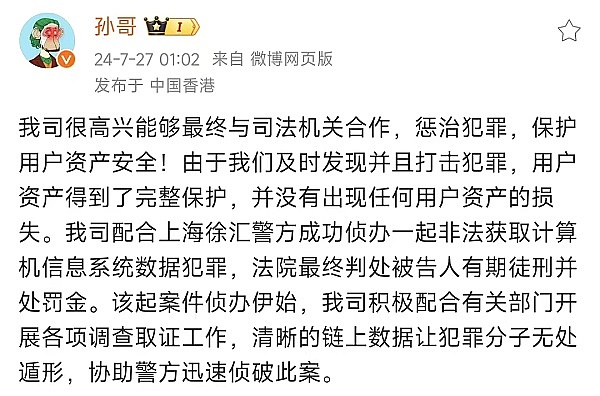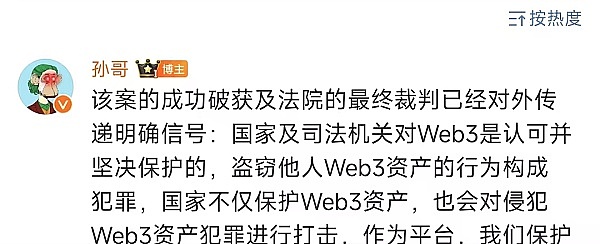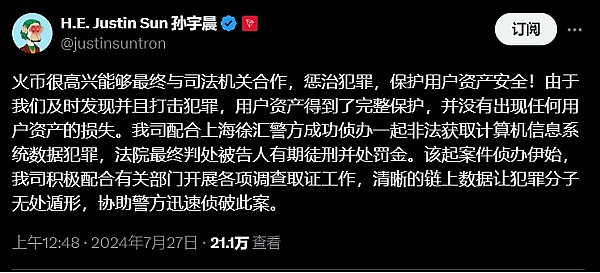Author: Lawyer Liu Zhengyao
On July 27, Sun Chenyu (also known as "Sun Ge" and "Sun Ge") tweeted on Weibo and X, saying that Huobi platform cooperated with the Shanghai Xuhui District police to solve a criminal case, protected the assets of users, and also punished and cracked down on virtual currency crimes. And Sun believes that after the court ruling, it shows that Chinese judicial organs recognize and protect web3: "The state not only protects web3 assets, but also cracks down on crimes that infringe on web3 assets" (but on X, Sun said: "The state not only protects virtual currency assets, but also cracks down on crimes that infringe on virtual currency." In fact, this difference in expression shows that Sun must be very clear about mainland China's policy on virtual currency, interesting)




1. Case Background
According to the Xuhui Procuratorate’s official account article “Who Touched His Million-Dollar Virtual Currency”, the case can be summarized as follows:
However, the three did not transfer Mr. Ou's virtual currency. The police continued to investigate and found that Zhang 2 had also implanted a backdoor in the virtual currency wallet of another platform used by Mr. Ou. Coincidentally, Zhang 2 also worked for Company A (Mr. Ou was really unlucky. Both wallets were tampered with by people, and they were all former or current employees of Company A). Zhang 2 was short of money, so he transferred Ou's virtual currency to his own wallet address through the above method, and then exchanged it for other virtual currencies to make a profit. According to statistics from judicial authorities, Zhang 2 illegally obtained more than 6,400 private keys and mnemonics of users.
There are actually two cases here, one is the case of Zhang 1, Liu, and Dong, and the other is the case of Zhang 2. And Mr. Ou's virtual currency was eventually transferred by Zhang 2. However, the defendants in these two cases were convicted of illegally obtaining computer information system data by the Xuhui Court, and both were sentenced to three years in prison.
Second, is virtual currency property or computer data?
Then the question arises. If in the case of Zhang 1, Liu, and Dong, the three implanted backdoor programs into other people's wallet software to obtain private keys, mnemonics, etc., but did not transfer the virtual currency in them and ultimately did not make a profit, so it constitutes the crime of illegally obtaining computer information system data; then, in the case of Zhang 2, he not only implanted a backdoor in Mr. Ou's wallet, but also transferred Mr. Ou's virtual currency worth millions through mnemonics. Doesn't this constitute theft under my country's criminal law? (Based on the amount, the starting sentence is at least 10 years in prison)
Why did Zhang 2 only constitute the crime of illegally obtaining computer information system data in the end? Essentially, it is because the Xuhui Court believes that Mr. Ou's virtual currency is not property in the sense of criminal law and is not worthy of protection under our criminal law; however, these virtual currencies are in the form of electronic data, so Zhang 2's behavior at least constitutes the crime of illegally obtaining computer information system data. In addition, Zhang 2 compensated Mr. Ou for part of the loss and obtained his forgiveness, which is also an important factor that led to the court's lenient punishment. However, Lawyer Liu has to remind you that the current criminal judicial practice of virtual currency is inconsistent. In some cases, the judicial authorities directly exchanged virtual currency into USDT, and then determined the amount involved in the case according to the exchange rate between the US dollar and the RMB (even if this is quite aggressive and has no legal basis).
From this point of view, whether virtual currency (especially mainstream virtual currency, such as BTC, ETH, USDT, etc.) is property or (property attribute or value-less) computer data, the current judicial practice is still unclear.

III. Lessons from this case
Back to the question at the beginning of this article, the article from the Xuhui Procuratorate did not mention which company Company A was, and there were no relevant clues on Sun Ge’s Weibo or X. However, it is inevitable that people will speculate whether Company A or the virtual currency wallet is related to a certain popular platform. This is also an issue that the KOL in the currency circle should always pay attention to in their daily publicity and promotion. Another point is that the Xuhui Court did not recognize the property attributes of virtual currency, and only treated virtual currency as computer data (a bit frustrating), but in reality virtual currency can indeed be exchanged with legal currency. In some criminal cases, other courts also recognized that mainstream virtual currency can be exchanged for legal currency to calculate the amount involved.
For Company A, it is crucial to manage its own products and increase employees' awareness of the rule of law. Although the currency circle is still mixed with good and bad, and even a little bit smoky, everyone still has a fair weight in their hearts. For the evildoers, even if they escape legal sanctions at the moment, very few can live freely for a lifetime.
For ordinary users, Lawyer Liu recommends that you must download wallet software from official and formal channels, and do not click on unfamiliar links at will. If you find that your assets have been stolen, you must collect evidence and report the case as soon as possible. Although the current Chinese judicial authorities have different perceptions and attitudes towards virtual currency, as ordinary citizens, seeking help from judicial authorities when their rights are infringed is still the most legal, compliant and economical choice.
 JinseFinance
JinseFinance










